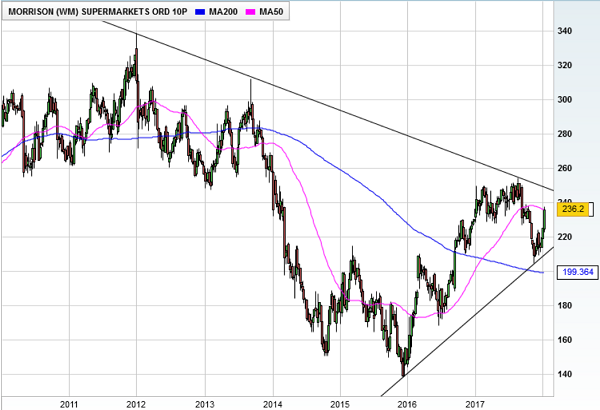Why Morrisons rocketed to multi-month high
9th January 2018 12:33
by Graeme Evans from interactive investor
Share on
A resurgent passed another crucial test with flying colours today as investors were given a fresh reminder about the impressive rebuilding job being done by chief executive David Potts.
Since taking the helm in March 2015, Potts has revived the fortunes of the Bradford-based chain through a focus on customer service, range enhancements and better stock availability.
This back-to-basics approach faced its stiffest examination yet over Christmas, given that the company was up against challenging trading conditions and the toughest comparatives of all the Big Four supermarkets.
Those jitters were reflected in UBS's decision last week to cut its underlying sales forecasts and to trim its price target to about 230p.
As it happened, today's update was full of positive surprises, with like-for-like sales from the Morrisons retail estate up 2.8% in the six weeks to January 7. There was an additional boost from its wholesale business, which grew sales 0.9% thanks to the earlier-than-expected start of a supply deal with .
Morrisons also said it had become more competitive after the price of a basket of key Christmas items remained the same as last year.
How this achievement has impacted margins at a time of input cost pressure remains to be seen. Significantly, the retailer made no change to its profits guidance despite delivering sales at the top end of City hopes.
Shares rose 2% to 231p today but remain stuck in a narrow trading range, with the stock only marginally higher than when Potts took over in 2015. Morrisons trades at 13.9x EV/EBIT multiple based on 2018 forecasts.
UBS made no change to its recommendation today, although it did nudge up its full-year earnings forecast by 1.9% to £452 million.
Analyst Daniel Ekstein said: "We had been nervous the volume response to lower prices may not have been so swift, but it seems to have hit the sweet spot."

The uncertain share price performance reflects the continued growth of Aldi and Lidl, with Kantar Worldpanel today reporting that the German discounters both grew sales by 16.8% year-on-year in the 12 weeks to Christmas Eve. They collectively managed to attract nearly one million additional households in the three month period.
This eroded Morrisons market share by 0.2 percentage points to 10.7%, while fell 0.3 percentage points to 16.4%. was the fastest growing of the Big Four, but still saw its share of the market dip 0.2% percentage points to 28%.
These figures offset more evidence of contrasting fortunes for food and non-food retailers over the Christmas period.
Kantar Worldpanel said an additional £1 billion went through supermarket tills compared to the same festive period last year, with the Friday before Christmas the busiest shopping day ever recorded with sales worth £747 million.
And despite rising food costs, Kantar said shoppers appeared more willing to trade up to more expensive options such as premium lines. This was highlighted by Morrisons reporting a 25% jump in sales of its "Best" range.
The approach appears to have left little in purses and wallets for clothing and other non-food items, with and revealing in recent trading updates that they had suffered the consequences.
This article is for information and discussion purposes only and does not form a recommendation to invest or otherwise. The value of an investment may fall. The investments referred to in this article may not be suitable for all investors, and if in doubt, an investor should seek advice from a qualified investment adviser.